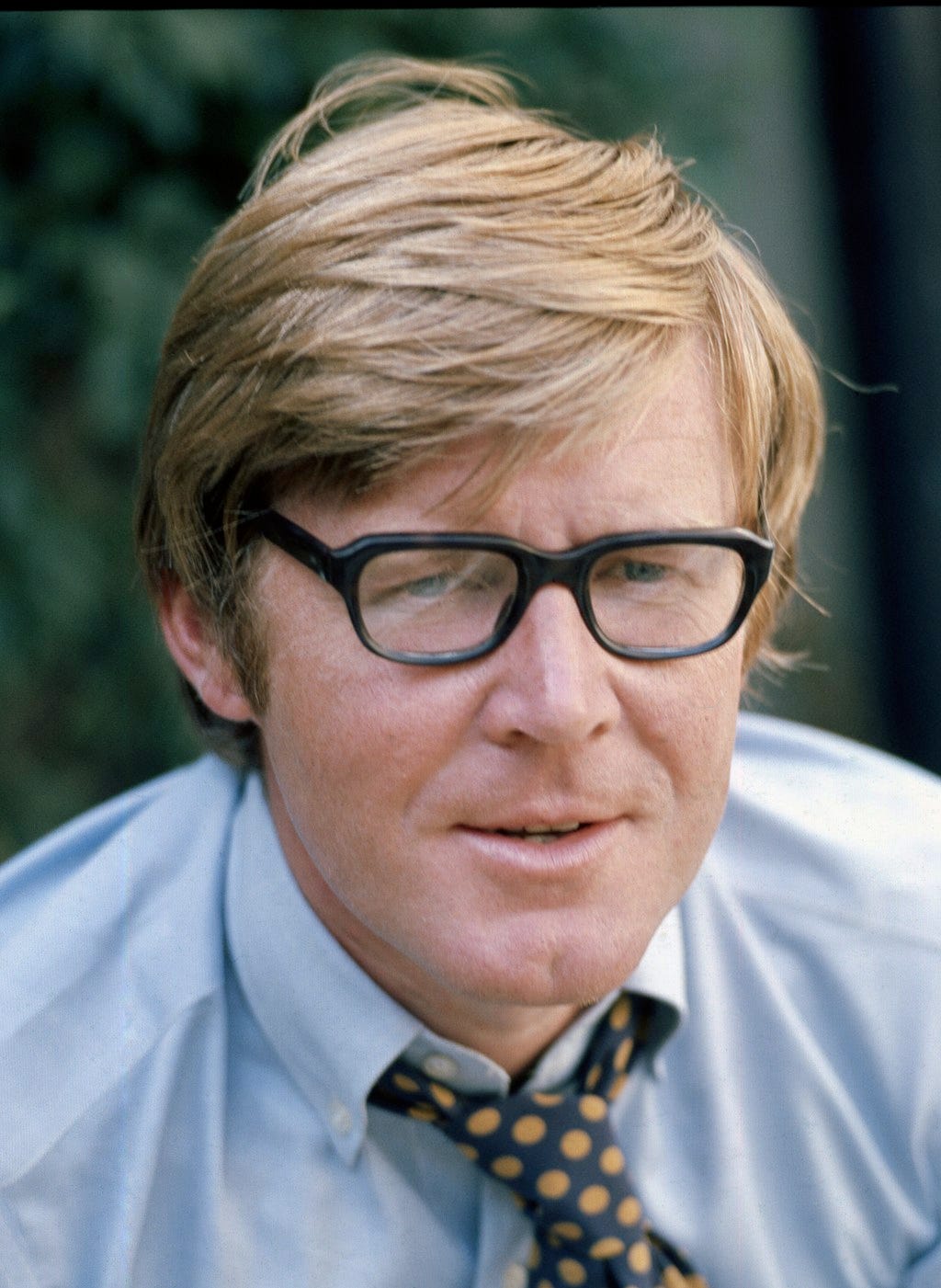In Praise of Alan Bennett
I'm quoting this somewhat obscure English playwright a lot lately. Here's why.
Alan Bennett, photographed in 1973 by Allan Warren.
I note with interest that I’ve quoted the English writer Alan Bennett twice this month, first in a story about Kamala Harris’s economic plan and again today in a story about how older voters may spare us a second Donald Trump presidency. That’s a lot, especially for a writer of whom most Americans, even most well-read Americans, have never heard.
My defense is that Bennett is irresistibly quotable. Eleven years ago I quoted Bennett in a Washington Monthly review of a book by my former Monthly colleague, the late Jonathan Rowe. Bennett’s gentle self-effacement and oblique irony endear him to readers in the United Kingdom, where, at 90, he enjoys a national-treasure status comparable to that in America of the prelapsarian Garrison Keillor. Like Keillor, Bennett is funny and rueful and wise. Writing in The New York Review of Books, Fintan O’Toole observes Bennett’s “dryly laconic Yorkshire tones and bespectacled ordinariness…. His very lack of glamour is itself the obverse side of fame, a way of backing into the spotlight.” But not in the United States. Bennett never caught on this side of the Atlantic, except during his extreme youth, when he was one of four brilliant talents in the 1961 hit revue Beyond the Fringe, which transferred successfully to Broadway. You can watch Beyond the Fringe here, and I recommend that you do. Sixty-three years later, the entire show feels remarkably fresh. If you don’t have time to watch the whole thing, advance to 1:38:09, where you’ll find Bennett’s best-known comic turn, a mock-ponderous Anglican sermon on Genesis: 27:11, “My brother Esau is an hairy man/ But I am a smooth man.”
Compared to the other Beyond the Fringe performers (Peter Cook and Dudley Moore, who made some movies together, and Jonathan Miller, medical doctor, stage director, and host of the 1978 documentary series The Body in Question), Bennett had no lasting fame in the United States. That may explain why a film adaptation of Bennett’s excellent 2018 play Allelujah remains, two years after the film’s British release, unavailable in the United States, even on streaming platforms. You may know some of Bennett’s other plays through film adaptations: The History Boys (2006), The Madness of King George (1994), and The Lady in the Van (2015), all directed by Nicholas Hytner and scripted by Bennett. Two decades ago I recorded a Slate “Spoiler Special” podcast about The History Boys with my friend Dana Stevens. To listen, click here. The Lady in the Van contains Maggie Smith’s last truly great film performance.
The film of Allelujah is not, as the stage play was, a Hytner-Bennett collaboration; it’s directed by Richard Eyre, who like Hytner is a former artistic director of the National Theater of Great Britain, and adapted by Heidi Thomas, showrunner for Call the Midwife. I presume that Bennett and Hytner were busy preparing another film that’s currently in production, The Choral. Bennett also has a novella due out in two weeks, Killing Time. Did I mention that Bennett is 90 years old? Somewhat maddeningly, Killing Time isn’t being marketed in the United States, but Americans can order a copy on Amazon UK.
My Anglophilic parents, both now deceased, turned me on to all the Beyond the Fringe talents, but especially to Bennett, whose TV plays aired on American cable channels in the 1990s during a very brief period when these channels were ravenous for capital-C British culture. During Trump’s presidency I would occasionally take solace in this clip from The Madness of King George, wherein Ian Holm demonstrates what to do with a chief executive who loses his marbles. “I am the king of England!” shouts Nigel Hawthorne’s King George III as courtiers tie him to a chair and prepare to gag him. “No, sir!” answers Holm’s Dr. Francis Willis as a Handel coronation anthem swells. “You are the patient!”
Today’s Republican Party can be summed up this way: Dr. Francis Willis is unavailable. His role is being handed off to voters. Anyway, long live Alan Bennett. My latest Bennett-quoting New Republic piece offers mild hope that the American gerontocracy will, in 2024, vote itself out of office. You can read it here.




Beyond the Fringe was terrific, even with the follow-on cast in London when we saw it.
There’s a fine collection of Bennett’s essays called “Writing Home.” It includes a startlingly frank account of his family’s history of mental illness.